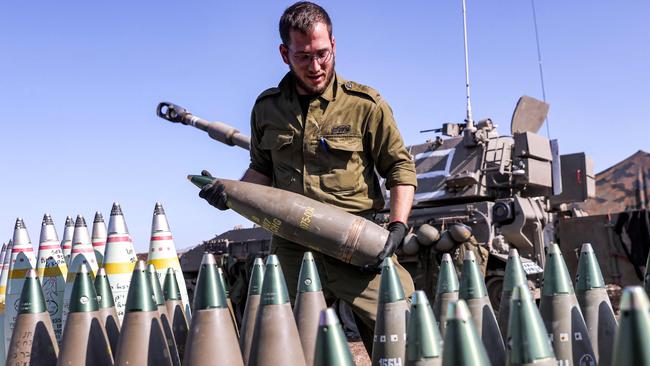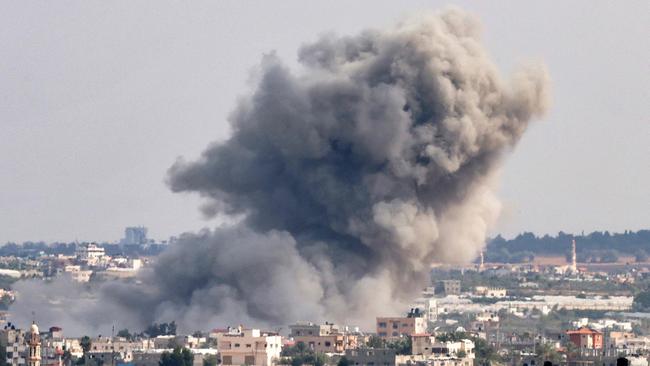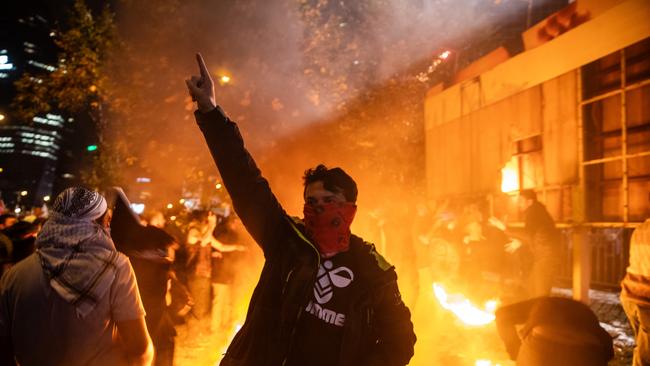War and investment combines for a cloudy future for stocks
Investors are fleeing some sectors and targeting others as war intensifies around the world and stock markets appear shaky.

SA Business
Don't miss out on the headlines from SA Business. Followed categories will be added to My News.
Ukraine. Russia, Africa, the Middle East. All over the world, wars are wrecking human lives, but sharemarkets remain relatively resilient in their post-pandemic rebound.
As geopolitical and humanitarian crises intensify, investors may be wondering what it will take for conflicts to create a major market downturn. And are there sectors to be avoided or targeted?
Sharp falls in the S&P/ASX 200 index late last week have left it 8.5 per cent below its February peak, but it remains higher than it was a year ago.
Analysts and economists say the outlook depends on whether the wars escalate, but agree that disruption will hit more than just share portfolios.
Viridian Financial Group chief investment officer Piers Bolger said a sharp downturn hinged on one key factor, “US direct involvement”.

That appeared unlikely at this stage, Mr Bolger said, with the US supporting allies in Europe and the Middle East without being directly involved – although US aircraft carrier strike groups moving to the Mediterranean increased potential volatility,
“In a broad context, markets can and do often move higher in periods of war post the initial shock or impact is digested,” Mr Bolger said. “We saw this most recently … markets are interconnected.”
Bell Direct analyst Grady Wulff said when geopolitical tensions rose, investors tended to flock to safe-haven shares and assets and sell out of higher-risk investments.
Investors had been buying into banks, gold and energy stocks, she said.
“The spike in the price of oil since Hamas attacked Israel has driven a rally for local energy stocks as investors fear a prolonged period of war will impact global oil supply,” Ms Wulff said.
Gold was popular in times of uncertainty, and the gold price had climbed almost 4 per cent in the past week.
“Technology has been on the investor chopping block in recent weeks as investors flee growth stocks in favour of safe havens,” Ms Wulff said.
“Investors may look to avoid equities or sectors with exposure to the Middle East in these times of escalating conflict, as well as travel stocks which have taken a hit in recent days as companies begin cancelling travel to and from Israel.”
BetaShares chief economist David Bassanese said wars were not generally good for market performance “as they give rise to higher business and consumer uncertainty and potentially higher inflation and interest rates”.
However, defence stocks could be boosted by arms build-ups, and post-war reconstruction could lift economic growth, corporate earnings and sharemarket returns.
“The most immediate risk is upward pressure on oil prices, and hence inflation and interest rates if there is any significant disruption to critical Middle East oil supply,” Mr Bassanese said.
“Tougher sanctions on Iran oil exports, for example, could see a surge in oil prices with risks to global economic growth.”
Trading platform Moomoo market strategist Jessica Amir said investors might consider taking some profits off the table when markets rallied in uncertain times.
“We are amid a potential major geopolitical event, which will likely cause volatility in markets to considerably pick up,” she said.
Recent oil price spikes would hit consumers in coming days.
“The oil price will likely rise again on concerns supply will be disrupted, as 30 per cent of the world’s oil is from the Middle East,” Ms Amir said.

“So consider getting exposure to oil. Institutional buying is starting to rise in oil companies that will benefit from higher oil prices.”
Similarly, increasing exposure to gold might be worthwhile.
“You could consider the iShares Global Gold Miners ETF, which tracks the world’s largest gold companies including Newmont, Barrick and Newcrest Mining,” Ms Amir said.
Ms Wulff said some investors targeted specific defence companies.
“Stocks like DroneShield and Xtek that operate in the defence space become an attractive investment for their respective operations during times of escalated tensions,” she said.
“Some other sectors that can remain resilient during times of rising tensions include consumer staples stocks as we saw with the Russia–Ukraine conflict in the early days.
“The impact of sanctions on Russia boosted demand for key staples products including grains and wheat, and thus increased prices too.”
Mr Bolger said in times of market stress he believed in focusing on quality and avoiding investments with significant leverage.
“Seeking to maximise the benefits of diversification where possible will provide a backdrop that can reduce the risk of negative returns,” he said.
Originally published as War and investment combines for a cloudy future for stocks



